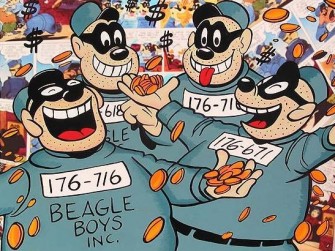 Home > Commentary and Features
Home > Commentary and Features Has The Comics Industry Really Done All That Well During Legitimate Recessions?
posted July 25, 2008
Has The Comics Industry Really Done All That Well During Legitimate Recessions?
posted July 25, 2008


How the comics industry will perform if the current recession gets worse is a topic of great interest to a lot of press, professionals and fans. One received piece of conventional wisdom bandied about during the resulting conversations is that comics always does well during recessions. The thought here is that comics has remained immune from the problems that hit other industries during tough times because a) comics have always been quite cheap, and thus a fine value when compared to other entertainment options, b) people turn to comforting entertainment in hard times, and c) comics fans are specifically devoted to the art form and not likely to give that up because they're out of work (or, let's be honest, on fire). The arguments tend to either end here or move into a line of questioning whether or not comics are still cheap enough to qualify for the dubious protection of point a.
Still, I get a little nervous when a bunch of people assume something to be true. So I wrote down a rudimentary list of past US recessions:
1929-1939
1953-1954
1957-1958
1973-1975
1980-1982
1990-1991
2001-2003
Then I wrote down a list of my initial impressions of comics during those eras:
1929-1939: Comic books basically not an industry yet for majority of period. Didn't have that first breakout success until after the second major economic downturn of the period (1937), and enjoyed greater success when period faded.
1953-1954: The post-War boom begins to fade.
1957-1958: Panic at the newsstands! Various companies consolidate their newsstand businesses. Stan Lee fires entire Atlas Comics art roster except for like four dudes.
1973-1975: The post-1960s Marvel hangover hits as people begin to wonder if comics will make it to 1980. Newsstands act in almost bizarre fashion at this point, and the Direct Market not quite up to speed yet.
1980-1982: The bigger 1980s surge
followed this period.
1990-1991: The black and white bust hangover, as a number of first-generation stores close. First goes under; Comico bankrupt. Fantagraphics begins Eros line to stay alive.
2001-2003: Marvel still in tatters as slow build back to respectability continues. Unit sales of comics actually bottoms out during this period.

Yikes.
I mean, I know that's only a bunch of first impressions, but it sure doesn't give me much confidence that comics has always done really well during periods of economic downturn. Clearly this called for more research.
Okay, since that wasn't going to happen, instead I asked John Jackson Miller of Comics Chronicle what he thought. John is my go-to guy when I need someone to sit me in front of them and talk to me slowly about something numbers-related in comics. You should click on
this link to his web site like ten times for his agreeing to write me back in this case.
Miller's basic response is that instead of the stellar record or even immunity from economic harm claimed on comics behalf during times of economic turmoil, comics has an up
and down record. First of all, going somewhere I wouldn't think to go in 100 years, Miller notes that the back-issues market behaves differently than the new issues market, and that it, indeed, has been steady. In fact, that market may even be the source of many of the quotes fueling the perception of comics as immune to economic traumas.
"I believe that historically comics have had a mixed record during recessions -- different parts of the market respond differently," Miller says. "The back-market tends to do just fine; Golden and Silver Age books tend not to lose their value in recessions. Nor even in comics market recessions, often. I can't say how many investors would look to them as a 'safe haven' as a practical matter, but a lot of the "comics do better in recession" quotes out there come from here. Certainly whenever I've used it, I should hope."
Second, Miller believes what has an impact isn't so much the shape of the economy, but the industry's exposure on factors that might then be specifically affected during an economic downturn. "The experience of the front-market tends to be less uniform, depending on how 'exposed' the business model is to the general economy," Miller says. "This explains the difference between performance in the examples you cite, to my opinion. The boom of the early 1990s was affected not at all by the recession in the general economy; but then we were hit along with the rest of the economy in the 1970s, when prices for mainline Marvel and DC comics doubled."
For Miller the key is how comics gets tied into factors of risk. "I've said before I think 'economics is local' where this is concerned -- the prevailing structural conditions in the field often trump whatever is happening outside -- or, better put, they either amplify or stifle the negative stuff coming in from outside. Conversely, if our model is fouled up, we don't feel the positives from an uptick in the economy -- just see the late 1990s!" Miller pointed at the 1973-1975 recession and the general economic malaise of that whole decade as an issue where structural issues hurt comics. "Retail was changing in the 1970s -- comics, which had been a loss leader for convenience stores, drugstores and the like, needed to become more profitable as the mom-and-pop store gave way to the big chains (7-Eleven, Walgreens, later Wal-Mart, etc.). The print-three to sell-one model pinched comics all the more in a period of high inflation and paper and transport price increases -- and so the structure of comics sales at the time made us more exposed to external forces."

This began to change by the late 1970s, which helped make the next recession a more manageable one. "It was only at the end of the decade that the growth of the direct market began to change the model for comics -- allowing us to get supply closer to demand and, in so doing, take a big variable out of the picture. I think we fared relatively better than might have been expected in the 1980-82 recession because of it. Not
much better -- the market doesn't really take off until 1982 or so -- but now there's a little more under the umbrella, so to speak.
Ten years later, when the minor recession that probably cost then-President Bush a second term was in full effect, comics had changed due to the rise of the Direct Market. "So in the early 1990s, we had more of a closed system where the risk was somewhat better managed for publishers -- though not retailers -- at the start; most of the sales were through comics shops, so publishers were printing comics that were pre-sold, in a sense. The waste in the system all collected at the bottom, with the retailers who blindly bought copies they could not sell: that eventually caught up with the industry -- and fatally so, in the case of
far too many businesses -- but it took a while. So the 1990s example may show a market that was less exposed to external economic forces; what did us in were the
internal forces." This was also, he believes, true of the 9/11 contraction.

Miller points out that the big difference in the market's current overall structure isn't the rise of the now well-established direct market but another rise, that of the bookstore part of the marketplace. "Today, I would say that, to the degree that publishers have come to rely on the bookstore market for trade paperback sales, they have assumed some new risk and exposure. The failure of large bookstore chains would have an impact, for example, greater now than in 2001." However, Miller doesn't believe in the thought that's been floated that trades are automatically less stable than comic books because of their higher price. "There is still significantly less risk involved in printing one trade paperback that does not sell in a month rather than printing six individual comic books -- the individual books are less likely to sell after that month is over, whereas the trade has shelf-life. We have managed to direct our market exposure, then, toward our less-risky stock; at least now, if we don't sell something immediately, it's not necessarily going into the incinerator at a cost to the publisher right away."
Because we can point to a few likely effects of a prolonged recession and general economic downturn today, such as entrenched high oil prices and a domino effect on every industry that depends on shipping, a structural factors argument like Miller's can be extended to conceptualize a likely effect or two. "As for seeing to what extent external variables like transport and paper costs could affect comics today, it's not always easy to parse out the effects," Miller says. "Changes in paper prices certainly have had a major effect on the market in the past -- paper costs spiked in the mid-1990s, and certainly didn't help our market which was already in a downturn. If that happened again, that would surely cascade through the system." I would assert -- although John chose not to -- that the Direct Market remains unstable in terms of the imbalance Miller describes in the 1990s, if it's not even more fragile that way now. The publishers have an extremely well-oiled system at their disposal that protects them from a great deal of risk; the retailers, still not so much, to the point where you could argue that the gains in that part of the market have been just as much about Darwinian principles (the surviving retailers tend to be really, really good ones) as they have been about structural improvements (Marvel policy changing after the Hibbs lawsuit, say).
So are we doomed or what? I'm cautiously optimistic, with a huge caveat or two. No one knows the shape of the economy one year or several years from now, even though there are enough guesses on all sides someone will get to claim prescience. What I would suggest is that comics has no guarantees, and if the past shows us anything it's that market conditions can exploit unique vulnerabilities, weaknesses we should be attempting to correct rather than ignore or exploit. History may not tell us exactly how poorly comics will do if the current economic troubles deepen and coarsen, but we know for sure that without preparing for the worst comics can be as susceptible to market whims as the next industry, with, I think, a lot more to lose.



